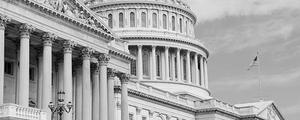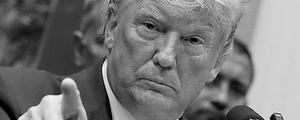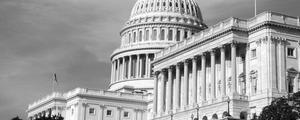WASHINGTON, D.C. -- As the impeachment process is speeding forward in a highly polarized Washington D.C., the assumption is that the mass media will exert tremendous political and societal influence on the proceedings. The full impact of the media, however, remains an open question given longstanding political science research as well as the emergence of new communication mechanisms. Both factors suggest that information on impeachment may take a different route to the American public than directly through the mass media.
William Gaston, of The Brookings Institute, recently laid out his framework for understanding public opinion on impeachment, saying, "Persuading the public to support impeaching and removing a president is a two-step process. The public must be convinced that the charges are true -- and that they are weighty enough to justify overturning the results of a presidential election." Galston also points out that President Nixon went 0-2 on these two phases, leading to his eventual resignation, while President Clinton split 1-1 and stayed in power.
The fundamental factor underlying everything is whether an informed public does or does not support impeachment and removal of the president from office.
But what will drive public opinion on these phases of impeachment?
One historically prominent theory suggests that people's political behavior is much more heavily influenced by the discussions people have with friends, family and others in their social network than by their exposure to mass media directly. This "two-step flow of communication" was first described by Paul Lazarsfeld et al. in their research on how people make up their minds in presidential campaigns (The People's Choice, 1944). Today such social persuasion may only be amplified through social media and other instant means of connecting people.
A partial explanation for the two-step communication theory may be found in the cost-benefit theory posited by Anthony Downs (An Economic Theory of Democracy, 1957). Downs maintains that individuals balance the cost of consuming political news against any anticipated benefits. He believes voters make a rational choice of whether or not to become fully engaged in any political debate, including whether ultimately to vote or not. Those who can afford to make the time and pay the costs for information become the attentive public. The remainder do not see the benefits of being informed as outweighing the costs and look for short-cuts to form opinions, including talking to those they know who follow the news closely.
Sean Trende has said, as one of his "Five Observations on the Politics of Impeachment" (RCP, October 2, 2019), that "Most people are disconnected from politics to varying degrees, and are content to follow the lead of like-minded party and opinion leaders."
So, who are today's opinion leaders?
Gallup has been measuring Americans' self-reported attention to news periodically for over two decades, using the following question: "Overall, how closely do you follow news about national politics -- very closely, somewhat closely, or not at all?" In the most recent poll, the largest group of Americans, 45%, devotes some attention to politics, while 23% are largely disengaged. However, 32% fall into the most attentive group, saying they follow national politics very closely. This is similar to the 26% who told Gallup last year they use Twitter.

Notably, today's opinion leaders are somewhat more Democratic and liberal than the population at large, but they are no different when it comes to approval of Trump. About four in 10 adults who follow the news very closely approve of the job Trump is doing, similar to the 44% who follow the news somewhat closely and 40% of those not following the news closely at all.
| Very closely | Somewhat closely | Not closely | ||||||||||||||||||||||||||||||||||||||||||||||||||||||||||||||||||||||||||||||||||||||||||||||||||
|---|---|---|---|---|---|---|---|---|---|---|---|---|---|---|---|---|---|---|---|---|---|---|---|---|---|---|---|---|---|---|---|---|---|---|---|---|---|---|---|---|---|---|---|---|---|---|---|---|---|---|---|---|---|---|---|---|---|---|---|---|---|---|---|---|---|---|---|---|---|---|---|---|---|---|---|---|---|---|---|---|---|---|---|---|---|---|---|---|---|---|---|---|---|---|---|---|---|---|---|---|
| % | % | % | ||||||||||||||||||||||||||||||||||||||||||||||||||||||||||||||||||||||||||||||||||||||||||||||||||
| Party ID | ||||||||||||||||||||||||||||||||||||||||||||||||||||||||||||||||||||||||||||||||||||||||||||||||||||
| Republican | 31 | 29 | 25 | |||||||||||||||||||||||||||||||||||||||||||||||||||||||||||||||||||||||||||||||||||||||||||||||||
| Independent | 29 | 41 | 50 | |||||||||||||||||||||||||||||||||||||||||||||||||||||||||||||||||||||||||||||||||||||||||||||||||
| Democratic | 40 | 30 | 25 | |||||||||||||||||||||||||||||||||||||||||||||||||||||||||||||||||||||||||||||||||||||||||||||||||
| Leaned Party ID | ||||||||||||||||||||||||||||||||||||||||||||||||||||||||||||||||||||||||||||||||||||||||||||||||||||
| Republican/Lean Republican | 43 | 46 | 44 | |||||||||||||||||||||||||||||||||||||||||||||||||||||||||||||||||||||||||||||||||||||||||||||||||
| Independent-no lean | 2 | 3 | 11 | |||||||||||||||||||||||||||||||||||||||||||||||||||||||||||||||||||||||||||||||||||||||||||||||||
| Democrat/Lean Democratic | 55 | 50 | 44 | |||||||||||||||||||||||||||||||||||||||||||||||||||||||||||||||||||||||||||||||||||||||||||||||||
| Political Ideology | ||||||||||||||||||||||||||||||||||||||||||||||||||||||||||||||||||||||||||||||||||||||||||||||||||||
| Conservative | 35 | 42 | 31 | |||||||||||||||||||||||||||||||||||||||||||||||||||||||||||||||||||||||||||||||||||||||||||||||||
| Moderate | 30 | 38 | 44 | |||||||||||||||||||||||||||||||||||||||||||||||||||||||||||||||||||||||||||||||||||||||||||||||||
| Liberal | 33 | 19 | 21 | |||||||||||||||||||||||||||||||||||||||||||||||||||||||||||||||||||||||||||||||||||||||||||||||||
| Trump Job Approval | ||||||||||||||||||||||||||||||||||||||||||||||||||||||||||||||||||||||||||||||||||||||||||||||||||||
| Approve | 42 | 44 | 40 | |||||||||||||||||||||||||||||||||||||||||||||||||||||||||||||||||||||||||||||||||||||||||||||||||
| Disapprove | 56 | 53 | 52 | |||||||||||||||||||||||||||||||||||||||||||||||||||||||||||||||||||||||||||||||||||||||||||||||||
| Gallup, Sep 3-15, 2019 | ||||||||||||||||||||||||||||||||||||||||||||||||||||||||||||||||||||||||||||||||||||||||||||||||||||
Another way to look at the partisanship of heavy news consumers, i.e., the potential influencers amongst the general public, is to see what percentage of Republicans and Democrats have reported paying very close attention to the news over time. As the trend below shows, this has varied, but right now, Democrats are a bit more attentive than Republicans (39% vs. 34%).

What this means for Trump is that Democrats are paying closer attention to the news, and therefore may be more heavily represented among "opinion leaders." But today's opinion leaders are similar to everyone else on the subject of Trump's job performance, so their net-impact on society's attitudes toward impeachment is likely to be nil.
Unless the opinions of the attentive group change in response to new information that comes out in the impeachment process, this group is not likely to sway the public strongly one way or another.
Where does that leave the media?
The cultural footprint of traditional news outlets is far smaller today than it once was. In the new digital media age, people have such a free flow of information online that any person can have access to news content while not relying on traditional media to deliver it to them. In other words, media-averse citizens have near-limitless ways to bypass the traditional press in forming their political views.
Lazarsfeld's two-step communication theory may be more relevant than ever, calling into question how much media coverage itself will affect public attitudes about impeachment as the process unfolds.
Now that the focus of impeachment is clearly on Trump's actions relative to Ukraine (and not the campaign matters at the heart of the Mueller investigation), it remains to be seen whether attitudes change. And more specifically, it remains to be seen if the information Americans do seek out and receive from opinion leaders merely reinforces their existing attitudes toward impeachment or eventually does move it in one direction or another.




